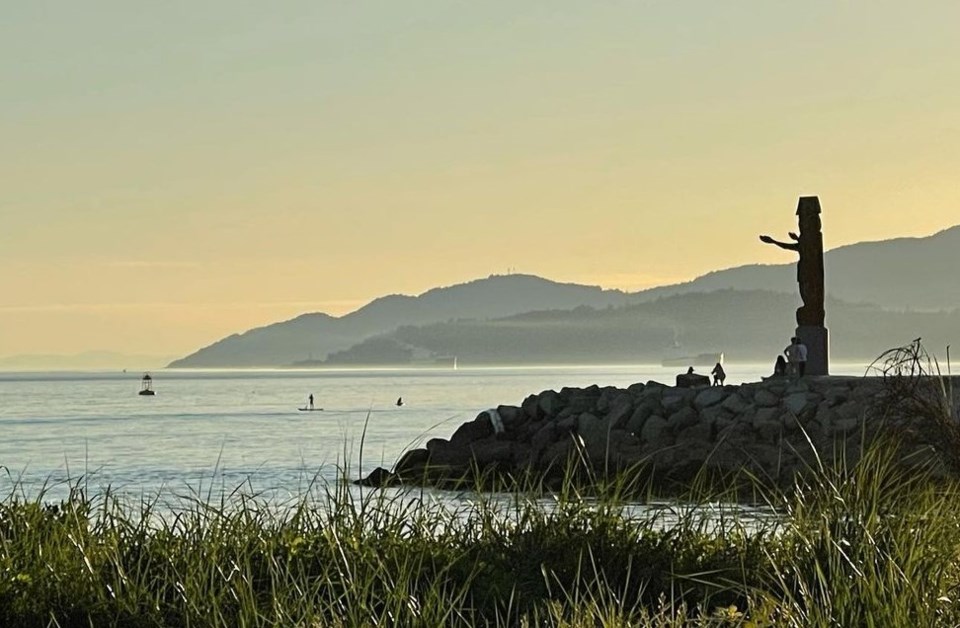After her AP Research teacher admittedly made a “blunder” during a land acknowledgement in the first day of class, an Ecole Sentinel Secondary student decided to use that moment as a launch pad to look into the effectiveness of the practice in high school classrooms.
Sierra Lee, who graduates in June from the West Vancouver school, said the moment led her to choose the practice as the topic for her research capstone project and see whether they are accomplishing their intended purpose.
“I saw the need for a project like this, given that we see land acknowledgements included in many settler institutions and [they] are becoming increasingly popular. So, that's why I definitely saw the need to do more research on this,” she said.
Her teacher, Christian Obeck, said not confidently knowing the First Nations territories on whose unceded land Sentinel resides, and being fearful of mispronouncing the Nations, led to Lee asking a “fascinating” research question, one which has now moved him to take a more deliberate approach to land acknowledgements in the classroom.
“Now, I have come full circle, and I now have a screenshot of the land acknowledgement on my computer, if I ever forget -- hopefully it'll be ingrained in memory very soon,” Obeck said.
Lee said while on her own personal journey of understanding Indigenous issues and decolonization, and her recent involvement with the North Shore Restorative Justice Society, she recognizes that it is an important step towards reconciliation but also noted they are often read from the same or similar scripts.
“There’s always been a thought at the back of my head that has wondered if, because they're typically delivered from the same script … if they really have the meaning that they intend to have,” she said.
Surveying a North Vancouver high school Grade 9 class that has had frequent exposure to acknowledgements through class projects and school practices, her research question of: “To what extent can the adoption of land acknowledgement practices in a BC high school encourage meaningful reflection and action among students around indigenous presence and ways of knowing and being, and reconciliation?” was met with some surprising results, Lee said.
After analyzing the results of her survey, Lee found there were four main takeaways, one being that students felt the practice allowed them to express feelings of gratitude, respect, and appreciation for Indigenous peoples.
“A lot of them mentioned that because of land acknowledgements at their school, they were able to recognize the privilege they have as a settler who resides on Indigenous territory,” she explained. “And another thing they really appreciated about land acknowledgments was that they considered them to be an important educational tool for them.”
Lee said there were a few students who noted that prior to participating in land acknowledgements, they didn’t know they resided on unceded territories.
“Others mentioned that they felt they learned more about Indigenous people’s culture … the idea of land acknowledgments being this important educational tool for them. I was really excited actually, when I initially found out that -- students actually do see the importance of these acknowledgments for these reasons,” she said.
However, in conjunction with the findings about the effectiveness of the practice, Lee also found out that students are craving more – more knowledge and more actionable things that can be done to further reconciliation.
“Students identified this lack of education beyond land acknowledgements, and that kind of hinders them from taking these additional steps to support reconciliation efforts or [to] decolonize themselves. And a lot of them emphasize the importance of further education centered around Indigenous issues to actually make land acknowledgement practices more purposeful.
“For example, 80.8 per cent of the students I surveyed actually disagreed or strongly disagreed that land acknowledgments are enough to achieve reconciliation with Indigenous peoples. It's clear that they recognize that there is this need for further action beyond land acknowledgments.”
Lee noted that part of her project also included further research on the subject herself, which she found that both Indigenous and non-Indigenous scholars have a concern that land acknowledgements have turned into a “box checking exercise.”
“Essentially, just an agenda item to check off of a list, that kind of lost their intended meaning, and also failed to encourage any further action or reflection amongst settlers,” she said, adding that her research found that some students surveyed believed the practice to be scripted and repetitive.
Lee said she was expecting most students to believe land acknowledgments lacked meaning but was “pleasantly surprised” to see a mixture of both perspectives, saying, “Although that was true to an extent, it can also be a very important practice to include in schools in order to educate students and allow them to further educate themselves and take additional steps beyond acknowledgement … and also do more to support reconciliation efforts.”
However, Lee said none of the students surveyed that day were Indigenous, and noted that the results do not speak for Indigenous people’s feelings toward the practice.
Obeck said Lee’s research project has given him the necessary “push forward” that he needed as a classroom teacher to consistently and regularly address land acknowledgments.
“I just think there's such a neat paradigm shift with the teachers sitting back and the students [taking the lead]. … I hope to give them the tools, and often, particularly in Sierra’s case, she brings back the gold, and I just sit back and listen and am amazed at what she teaches the teacher,” he said.




